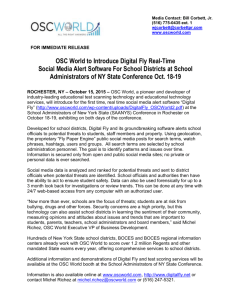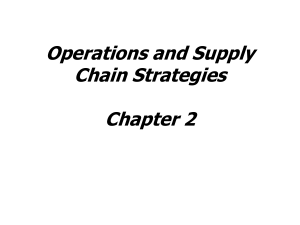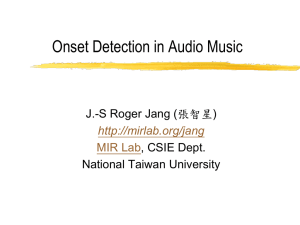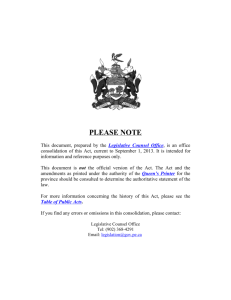5 USC §2302(b) (1)
advertisement
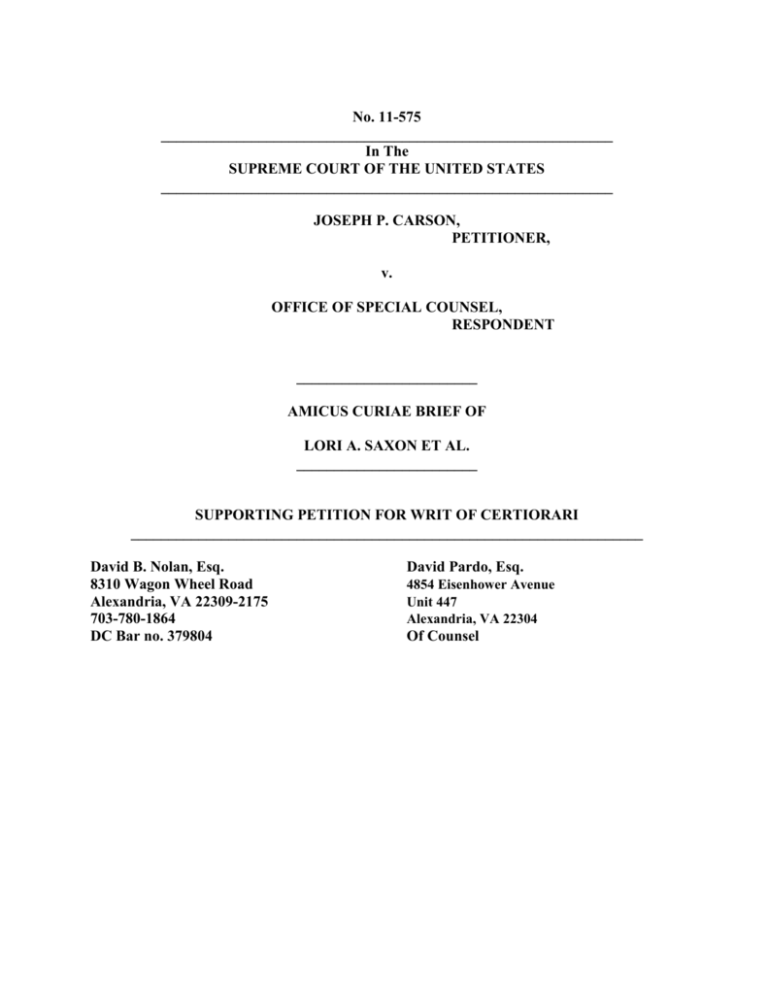
No. 11-575 ____________________________________________________________ In The SUPREME COURT OF THE UNITED STATES ____________________________________________________________ JOSEPH P. CARSON, PETITIONER, v. OFFICE OF SPECIAL COUNSEL, RESPONDENT ________________________ AMICUS CURIAE BRIEF OF LORI A. SAXON ET AL. ________________________ SUPPORTING PETITION FOR WRIT OF CERTIORARI ____________________________________________________________________ David B. Nolan, Esq. 8310 Wagon Wheel Road Alexandria, VA 22309-2175 703-780-1864 DC Bar no. 379804 David Pardo, Esq. 4854 Eisenhower Avenue Unit 447 Alexandria, VA 22304 Of Counsel TABLE OF CONTENTS Page TABLE OF AUTHORITIES ................................................................. ii IDENTITY OF AMICUS CURIAE, ITS INTEREST IN THE CASE, AND SOURCE OF ITS AUTHORITY TO FILE ........... 1 SUMMARY OF THE ARGUMENT ....................................................... 5-8 ARGUMENT .............................................................................................. 9-14 CONCLUSION ......................................................................................... 15 TABLE OF AUTHORITIES Cases Page Burlington North. & Santa Fe Ry. Co. v. White, 126 S.Ct. 2405 (2006) ........................................................................ Weber v. Dept. of Army, 209 F.3d 756 (D.C. Cir. 2000) ..................... Statutes 5 U.S.C. §1103(a) (5) 5 U.S.C. §1104(b) (2) 5 U.S.C. §1201 App. 5 U.S.C. §1204(a) (3) 5 U.S.C. §1211 5 U.S.C. §1214(e) 5 U.S.C. §1214(g) 5 U.S.C. §1218 5 U.S.C. §1219(a) (3) 5 U.S.C. §2301(b) 5 U.S.C. §2302(a) (2) (A) (xi) 5 U.S.C. §2302(b) 5 U.S.C. §2302(b) (1) 5 U.S.C. §2302(c) Pub. L. 101-12, Federal Whistleblower Protection Act of 1989 (WPA) Pub. L. 103-424, U.S. Office of Special Counsel Reauthorization Act REGULATIONS 5 C.F.R. §1810.1 28 C.F.R. §0.25 Other American Bar Association (ABA) “Model Rules of Professional Conduct” CONSENT OF THE SOLICITOR GENERAL Per Supreme Court Rule 37(2) (a), the Solicitor General was notified of the intent to file this amicus curiae brief and did not oppose. IDENTITY OF PARTIES TO AMICUS CURIAE BRIEF AND THEIR INTEREST IN THE CASE Parties to this amicus curiae brief are individuals or organizations who are aligned, for a variety of reasons with the objectives of Joseph Carson, PE, as detailed in his petition.1 2 They agree with Mr. Carson’s contentions that Office of Special Counsel (OSC) has no basis in law to claim that: 1) when OSC closes a complaint it receives, after determining it does not have jurisdiction to investigate its merits, then no court can review its negative jurisdictional determination, 2) when OSC opens a substantive investigation of a complaint, then OSC can end it without determining whether there are “reasonable grounds to believe” the alleged violation of law occurred - and no court can review its actions, and 3) when OSC conducts an investigation 1 Joseph Carson, PE, is the chair of the OSC Watch Steering Committee and David Nolan is its legal advisor. Mr. Carson contributed financially to the printing of this brief. Mr. Nolan, a former White House member of the Office of Counsel to the President, actively sought the nomination of President Obama to be Special Counsel, head of OSC. This position has been vacant from October 2008 until June 2011. David Pardo is a federal whistleblower protection advocate. 2 Lori A. Saxon, Herbert Travis, Karen Sypher, Darlene Price, Jim Faller, Dorothy Pritchett, Lawrence C. Carter, Tim Hunter, Janet Howard, Joseph Santos, Sheryl Syrkes, Deborah Minor, and Larry Wilkerson. 3 and determines the alleged violation occurred, then OSC can still close its investigation without formally reporting its determination to the involved agency (and apparently even the respective complainant) - and no court can review its actions. The amici agree that Mr. Carson’s contentions of a 33 year-long “broken covenant” are well-evidenced, far-reaching, made in good faith and merit consideration by the Office of Legal Counsel of the Department of Justice.3 They hope that Special Counsel Carolyn Lerner, per her explicit statutory authority,4 will direct the Office of Legal Counsel to substantiate or dispel these concerns, given her mandate to “act in the interests” of every concerned federal employee who seeks her protection - there should be no reasonable questions about how agency heads, the Special Counsel and the members of the MSPB interpret and apply their respective nondiscretionary statutory duties to: (1) prevent prohibited personnel practices (PPP’s),( 2) protect members of the civil service from PPPs, and (3) determine whether members of the federal civil service are, either overall and/or in specific agencies, adequately protected from 3 See www.broken-covenant.org - Mr. Carson alleges that since 1978, the Presidents, agency heads, members of the Merit Systems Protection Board and Special Counsel of the Office of Special Counsel have failed to comply with their fundamental duty to members of the federal civil service, by the Civil Service Reform Act of 1978 - to ensure they are adequately protected from reprisal, discrimination, personal favoritism or other types of prohibited personnel practices (PPPs), so they can perform their vital duties for the health, safety, security, and welfare of Americans, in a trustworthy fashion, per the merit system principles. 4 See 28 U.S.C. sections 510-512; 28 C.F.R. 0.25; and www.justice.gov/olc 4 PPP’s. There are well-founded concerns that these duties were improperly interpreted away, 33 years ago, thereby contributing to a battered federal civil service and a much diminished and more threatened America. Special Counsel Lerner, our nation’s chief enforcement officer for civil service law, has given her mandate to “act in the interests” of concerned members of the federal civil service, should promptly task the Office of Legal Counsel to substantiate or dispel concerns about this purported “broken covenant.” Finally, the amici are concerned that the Solicitor General did not even ask the new Special Counsel, Carolyn Lerner,5 about her views of this case before filing a waiver of response with the Court, despite her being the head of the most independent federal law enforcement agency in American history and despite there being no precedent for OSC a being party in a case before the Supreme Court. Summary of Argument The amici contend that since the decision in Weber v. United States, 209 F.3d 756 (D.C. Cir. 2000), which clearly determined that OSC’s negative jurisdictional determinations, when used as the basis to terminate its investigations are subject to district court review, the Office of Special Counsel violated its statutory mandate to “act in the interests” of concerned federal employees seeking its protection to argue otherwise in the cases leading up to this petition. The Amici hope that Special Counsel Lerner will make another clear break with the past at OSC by 5 Special Counsel Lerner was confirmed by the Senate on April 15, 2011 and assumed her duties in June. 5 prevailing upon the Solicitor General to file a confession of error response to Mr. Carson’s petition and establish policy that OSC will no longer make such an argument in Court. Her not being given an opportunity to do so, given the incontrovertible facts about OSC’s jurisdictional investigation of Calvin Weber’s complaints in 1993 and the determinations of the Weber court, would harm her efforts to establish credibility that she and her office will adhere to its mandate to “act in the interests” of concerned federal employees. The amici believe Ms. Lerner should moot this case, regardless of how the Supreme Court rules on Mr. Carson’s petition by, ( 1) establishing policy consistent with Weber v. United States, 209 F.3d 756, 758 (D.C. Cir. 2000) that OSC will no longer contest that federal district courts have subject matter jurisdiction to review OSC’s negative jurisdictional determinations, and (2) re-opening Mr. Carson’s complaints on the presumption that “civil service rules” include agency personnel directives affecting terms and conditions of employment. The amici think Special Counsel Lerner has both the statutory independence and statutory mandate to so prevail upon the Solicitor General and/or moot this case. Argument 1. The Special Counsel of the U.S. Office of Special Counsel, Carolyn Lerner, is an Executive Branch official with the most independence as head of the most independent federal law enforcement agency in American history, albeit small in staff size and with a specialized statutory enforcement mission.6 2. 6 Special Counsel Lerner has a statutory mandate to “act in the interests” of concerned OSC has only about 110 full-time employees and a budget of about 20 million dollars/year. 6 federal employees who seek its protection. 3. Special Counsel Lerner inherited a battered, dysfunctional office, widely discredited in the eyes of the people it is supposed to protect, i.e. members of the federal civil service. 4. Special Counsel Lerner has taken, since assuming office in June 2011, unprecedented steps to protect concerned federal employees and establish case law about the scope of her power to protect them, thereby establishing credibility for OSC. Her potential actions in this case are just as important, if not more so, to her establishing credibility for OSC’s mandate. 5. The relevant Office of Legal Counsel Opinions about the authority of the Attorney General and/or independence of the Special Counsel does not justify the Solicitor General filing a waiver of response in this case without Special Counsel Lerner’s specific authorization. 6. Given the incontrovertible facts about OSC’s processing of Calvin Weber’s complaints and the decision in Weber, Special Counsel Lerner should prevail upon the Solicitor General to file a confession of error in this case. 7. Mr. Carson has no other option for remedy if the Office of Special Counsel’s negative jurisdiction stands unreviewed and unchanged. 8. The Office of Special Counsel, despite its singular importance in ensuring government regularity, has not previously been a party before the U.S. Supreme Court. 9. Mr. Carson’s concerns of “broken covenant” are well-evidenced, long-standing, far reaching, and made in good faith. 7 The Statutory Independence of the Special Counsel of the U.S. Office of Special Counsel The Special Counsel of the Office of Special Counsel is the most independent official within the Executive Branch and the most independent federal law enforcement officer in American history. While nominated by the President and confirmed by the Senate, she does not serve at the pleasure of the President. She has a fixed five year term and can be removed, only by the President and only for “inefficiency, neglect of duty, or malfeasance in office.”7 No other Executive Branch official serves for a fixed term of office as the sole head of an independent Executive Branch agency, not even the Director of the Federal Bureau of Investigations (FBI), which is part of the U.S. Department of Justice. This independence is necessary given the Special Counsel’s statutory mandate to “act in the interests” of federal employees seeking its protection from reprisal, discrimination, personal favoritism, as well as other types of “prohibited personnel practices (PPPs) and “other prohibited activities,” regardless of who is the alleged offending official. Even the Attorney General or Solicitor General can be investigated by her office for PPPs or other prohibited activities within OSC’s enforcement jurisdiction. OSC has the independence and authority as a federal law enforcement agency to investigate senior White House officials, Cabinet Level Officers, or Presidentially nominated, 7 See 5 U.S.C. section 1211. See related Office of Legal Counsel Opinions, “Authority of the Special Counsel of the Merit Systems Protection Board to Litigate and Submit Legislation to Congress,” 8 U.S. Op. Off. Legal Counsel 30, 32, 1984 WL 178351 (O.L.C.) and “Presidential Appointees - Removal Power,” 2 Op. O.L.C. 120 (1978). 8 Senate Confirmed officials who serve for fixed terms, such as the Director of the FBI or Commissioners of the Security and Exchange Commission, for violations within its jurisdiction; determine whether disciplinary action, including removal, is warranted; prepare a complaint and statement of supporting facts; obtain a response from the involved official; and then submit them to the President for appropriate action.8 9 By law, OSC Annual Reports go only to Congress and “shall include whatever recommendations for legislation or other action by Congress the Special Counsel may deem appropriate.” No other agency has such a statutory “carte blanche” with Congress.10 OSC has jurisdiction over the Attorney General and the Department of Justice for the laws within its enforcement jurisdiction. Consistent with its investigatory independence - including into complaints of wrongdoing by senior Department of Justice officials - should OSC need to enforce its subpoena in Federal Court, it is represented by the Merit Systems Protection Board, 8 See 5 U.S.C. section 1215(b) and Office of Legal Counsel opinion, Presidential Appointees - Removal Power,” 2 U.S. Op. Off. Legal Counsel 107, 1978 WL 15279 (O.L.C.). 9 See OSC’s press releases AAAA 10 See 5 U.S.C. section 1218 and Office of Legal Counsel opinion, “Authority of the Special Counsel of the Merit Systems Protection Board to Litigate and Submit Legislation to Congress,” 8 U.S. Op. Off. Legal Counsel 30, 32, 1984 WL 178351 (O.L.C.). See President Bush’s signing statement for the Whistleblower Protection Act of 1989, which made OSC an independent federal agency. 9 not the Department of Justice.11 The Statutory Mandate of the Special Counsel OSC has an explicit, singular, statutory mandate to “act in the interests” of federal employees seeking its protection from agency violations within its enforcement jurisdiction. The Solicitor General, as the Attorney General, must condition the representation of OSC by that statutory mandate - that Department of Justice (DOJ) actions in representing OSC must be consistent with its mandate to “act in the interests” of Mr. Carson, a federal employee. The amici fail to see how the Solicitor General’s waiver of response would be consistent with that mandate. Special Counsel Lerner inherited a battered, dysfunctional office, widely discredited in the eyes of the people it is supposed to protect - members of the federal civil service.12 Since assuming office in June, unprecedented steps to protect concerned federal employees and establish case law about the scope of her power to protect them.13 This case, apparently the first time OSC has been a party to a case before the Supreme Court, offers her a highly visible opportunity to demonstrate that she will act in the interests of concerned federal employees by her prevailing upon the Solicitor General to file a response of confession of error. If the Court gives her this opportunity and she foregoes it, it will speak much more clearly than all the press releases she has issued about her commitment to protect concerned federal employees.14 11 See 5 U.S.C. sections 1212(b) (3) (A) and 1204(c). 12 See XXXX 13 See XXXX 14 See xxxx 10 The relevant Office of Legal Counsel Opinions about the authority of the Attorney General do not justify the Solicitor General filing a waiver of response in this case without Special Counsel Lerner’s specific authorization.15 Given the incontrovertible facts about OSC’s processing of Calvin Weber’s complaints and the decision in Weber, Special Counsel Lerner should prevail upon the Solicitor General to file a confession of error in this case. The appeal Court in Weber took the unusual step of appointing an amicus curiae to assist Mr. Weber, who was pro se, see APP. when it was presented with the-then novel legal question for a federal agency’s ability to deny jurisdiction without judicial review. The summary of Weber is that OSC determined in its CEU that it did not have jurisdiction to investigate his complaints on the merits and terminated its investigation on that basis. APP. The federal district court determined it did not have jurisdiction to review such a negative OSC jurisdictional determination. APP. The Appellate Court found that federal district courts did have such jurisdiction, but instead of remanding the case to a federal district court, it conducted its own review of OSC’s negative jurisdictional determination and agreed with it. (APP). The parties in Weber did not dispute that OSC had conducted a determination of its jurisdiction for Weber’s complaints, decided that it did not, and terminated its investigation on that basis. See 15 See 6 U.S. Op. Off. Legal Counsel 47, 1982 WL 170670, “The Attorney General’s Role As Chief Litigator for the United States,” *54-55, “Nevertheless, it must be stressed that the exercising supervisory authority over the conduct of agency litigation, the Attorney General will generally defer to the policy judgments of the client agency.” App. 11 The parties agreed that OSC, based on its negative jurisdictional determination, had declined to investigate the merits of Mr. Weber’s complaints. How OSC complied with its duty that it “shall investigate any complaint” it receives for Weber’s complaints is its long-time standard operating practice, because OSC receives many complaints that are outside its enforcement jurisdiction annually see APP OSC processed Mr. Carson’s complaints in identical fashion. Its CEU determined they were outside OSC’s jurisdiction and OSC’s used that negative jurisdiction determination as the basis to terminate its investigations. See APP At the trial Court, in Carson v. Office of Special Counsel, OSC somehow claimed Weber was irrelevant, even though it admitted that it had conducted a jurisdictional investigation of his complaints and determined it did not have jurisdiction. APP. The trial court did not accept OSC’s argument. It just found that in no circumstance could it review any OSC negative jurisdictional determination when used to terminate an investigation. App To the appellate court, OSC significantly altered its argument, in ways contradicted by the undisputed, incontrovertible, facts in Weber. To the appellate court, OSC argued: “Weber is the only one of the three cases relied upon by Carson that actually involved a mandamus petition against OSC. However, it provides no more support for Carson’s arguments than in Wren or Barnhart. The issue in Weber was whether OSC had a ministerial duty to investigate the petitioner’s complaint. Weber, 209 F.3d at 759. OSC had “declined to investigate” the complaint based on its belief that it lacked jurisdiction over any allegation concerning revocations of security clearances. (FN 8) Id. at 758. The D.C. Circuit’s Analysis of the jurisdictional issue – i.e., whether OSC had jurisdiction to investigate allegations concerning 12 security clearances – was undertaken for the purpose of determining whether OSC on a ministerial duty to the petitioner to investigate. Id. at 760. The D.C. Circuit concluded that OSC did not have a clearly established (i.e. “ministerial”) duty to act. Id. Further, because OSC had not, in fact, investigated (emphasis added), the appellate court had no occasion to address whether OSC’s decisions to terminate investigations would be subject to judicial review. Thus nothing about the Weber decision can be read to support the proposition that OSC’s decisions terminate investigations, if based on legal grounds, are subject to judicial review. FN 8 Carson provides a copy of the D.C. district court’s unpublished memorandum opinion in Weber in an effort to demonstrate that OSC actually investigated Weber’s complaint. The D.C. district court never explicitly held that OSC investigated Weber’s complaint. To the contrary, it observed that OSC had dispense[d] with an investigation...” Weber v. U.S. Office of Special Counsel, Civil Action 97-2260-LFO, Mem. Op., p.6 (D.D.C. Feb. 10, 1999) (unpub.) (attached, Addendum C). He also cites Weber v. Department of the Army, 59 M.S.P.R. 293 91993), in an effort to show that OSC investigated Weaver’s complaint. There, the MSPB concluded that it lacked jurisdiction because Weber had not shown that OSC “notified him that it had terminated its investigation of its allegations…” Id. at 295. At best, this observation reflects that MSPB’s assumption that OSC would investigate/was investigating Weber’s complaint. OSC was not a party to the case and, thus, never made any representation about whether it had investigated Weber’s complaint. Mr. Carson repeatedly, despite the unyielding opposition of OSC, tried to supplement the case record after OSC made this new, and factually erroneous, argument to the Appeals Court. There is no difference in how OSC complied with its duties to “shall investigate any complaint” 13 for Mr. Weber’s or Mr. Carson’s complaints, the fact situations are identical. The amici realize OSC made these incorrect representations to the Court and opposed Mr. Carson’s efforts to correct the record before Special Counsel Lerner’s tenure, but are dismayed that she has not, to this point, made it her business to set the record straight at the Supreme Court, consistent with her duty to “act in the interests” of Mr. Carson, a federal employee. The amici anticipate that this brief helps persuade her to do so. The amici want to trust Special Counsel Lerner to do her duty. They want to trust that she will act in our interests in protect federal employees from PPPs and other prohibited activities. They want to be able to tell concerned federal employees that, finally, that they have reason to believe a Special Counsel will comply with her duties to act in their interests and protect them. This case provides an unprecedented opportunity for her to do so. OSC has never been party to a case at the Supreme Court before, let alone one involving a split in the circuits about an important issue of law - whether federal district courts can review OSC’s negative jurisdictional determinations, when used to terminate its investigations. The amici do not question that OSC receives many complaints that are outside its enforcement jurisdiction. They do question, given Weber, why Special Counsel Lerner would want or allow another review of this clearly settled legal question to occur. This is particularly so given how when OSC’s changed its arguments about Weber to the appellate court and opposed Mr. Carson’s (unsuccessful, because of its opposition) efforts to supplement the case record to refute them. Special Counsel Lerner will not earn public trust by acting or allowing such untrustworthy behavior to occur on her behalf in front of the Supreme Court. She has to rise to the occasion to 14 take control of this critical issue, consistent with her positive actions to protect federal employees who turn to OSC for protection (frequently the one and only chance for protection) - instead of finding pretextual reasons not to, something that Mr. Carson clearly experienced from her predecessors, just as far too many others have at OSC over the years. Mr. Carson has no other option for remedy if the Office of Special Counsel’s negative jurisdiction stands unreviewed and unchanged. The descriptions of the relevant statutory framework for his complaints of “other prohibited activities” in the trial court and appeal court decision are inaccurate, if OSC does not seek corrective action on his behalf, he cannot seek remedy at the Merit Systems Protection Board via an Individual Right of Action (IRA) appeal, per 5 U.S.C. section 1221, because that remedy is only available for the whistleblower reprisal type PPP, codified at 5 U.S.C. 2302(b)(8), which is just one of the twelve types of PPP codified in law at 5 U.S.C. section 2302 (b)(1)-(12) and is not available for any of the “other prohibited activities” codified at 5 U.S.C. section 1216(a)(1)-(4) Conclusion For all the above reasons, amici hope the Court will direct a response from OSC before dispositioning this important case. Respectfully submitted, David B. Nolan, Esq. 15
